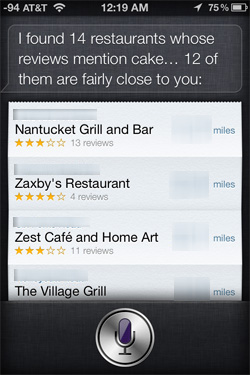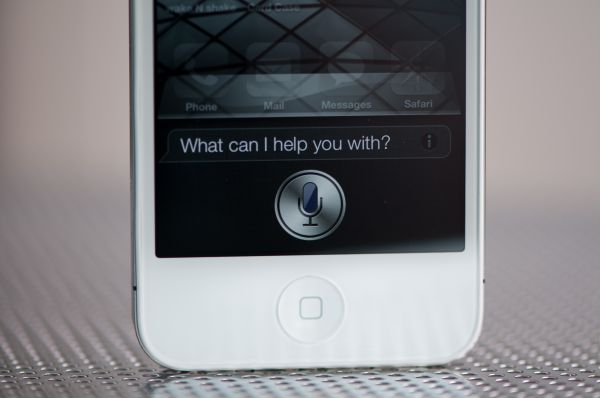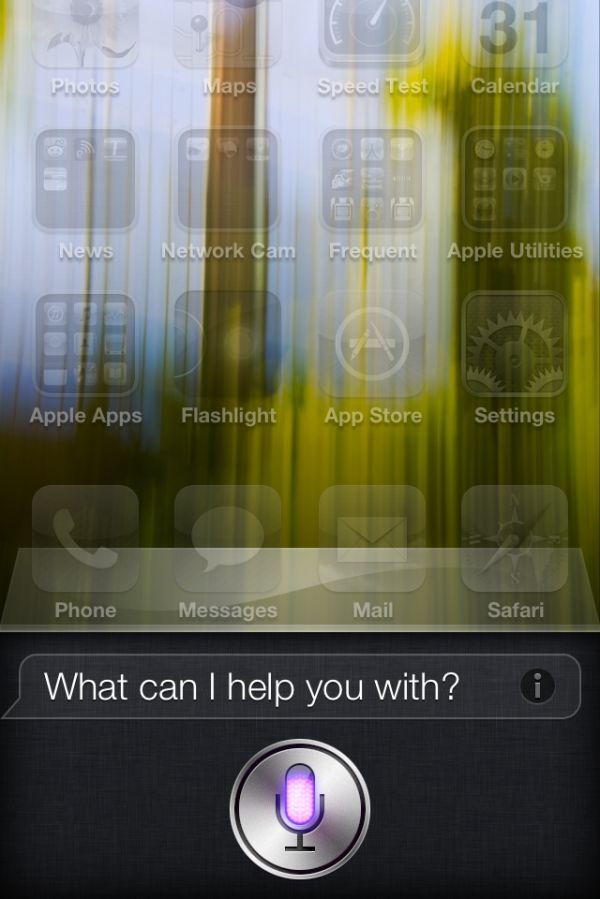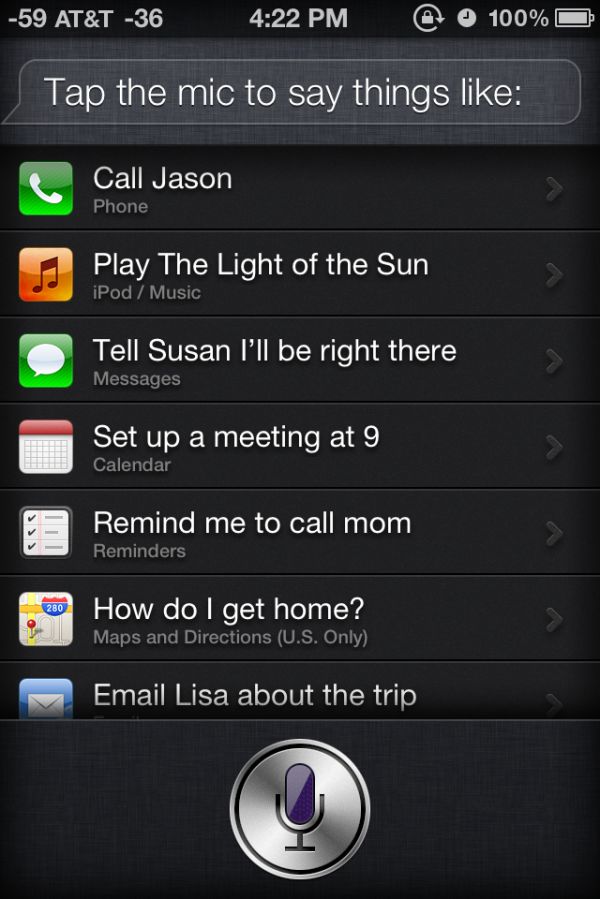Apple iPhone 4S: Thoroughly Reviewed
by Anand Lal Shimpi & Brian Klug on October 31, 2011 7:45 PM EST- Posted in
- Smartphones
- Apple
- Mobile
- iPhone
- iPhone 4S
Siri
Apple can credit much of its success to not only delivering good hardware, but using the hardware to develop new software experiences. With the 4S and iOS 5, most of the software experiences are available on older hardware - the sole exception being Siri.
The expectation that Apple will always deliver more than just a hardware upgrade is likely what made Siri a 4S exclusive (that and controlling the rollout as to not overly burden Apple's servers). The work carried out on the phone itself is minimal compared to what’s done server-side. A quick look at CPU utilization while running a simple Siri query (how many meters are in a mile) reveals the most stressful part of the process is animating the results on the screen. The display process is multithreaded but even then peak usage rarely steps above a single CPU core, in other words - this could have been done on the 4.
Siri is the logical next step from after the existing voice engine on the iPhone 4, which I doubt many people used on a day to day basis. Functionality was limited to a small laundry list of operations, and if you wandered outside the confines of those voice commands, you were left out of luck. I can count the number of times I did anything with the iPhone 4 voice commands on one hand.
Siri originally started as a standalone application, where it initially impressed with the ability to take a conversational approach to voice commands. Apple quickly acquired Siri, built it into iOS 5, and enabled the feature on just the iPhone 4S. At present, the feature only works for English (US, UK, Australia), French, and German, though in 2012 the language engine will also be compatible with Japanese, Chinese, Korean, Italian, and Spanish.
Hold the phone up to your head when not in a call, or long press the home button (which was the previous voice command action) and you’ll get Siri’s purple microphone and a circle button. If you’re familiar with Android’s voice dialogs, this visualization is pretty similar, though the functionality is very different.
Siri also works with bluetooth headsets and normal headsets, including the Apple-supplied button plus microphone earbuds. Normally Siri doesn’t read text messages or emails, but if you have a headset, it then reads everything back to you and becomes a much more powerful hands-free tool. Hold down the action button on a bluetooth earpiece or on the Apple earbud cable, and it will toggle Siri mode the same as holding the home button down. Bluetooth functionality works pretty well, though there’s added latency each time the earpiece audio link is established and torn down that can be unnerving.
Siri leverages Yelp for businesses/restaurants and Wolfram Alpha for any queries that require computation. It is interesting to think of Siri as Apple’s foray into search. Siri isn’t designed to monetize search, but any queries run through Siri definitely don’t line Google’s pockets. Given how much Google depends on search for its revenues and the growth of its businesses, Siri may be viewed as a competitive threat. Perhaps that’s why we don’t see Siri using Google for search?
There are two components to every Siri interaction: your query, and the results it returns. Where Siri is truly impressive is in its ability to understand your queries. You can ask it to tell you the closest Italian restaurants, or just utter the phrase “I want cake” and get a list of options in the area. For the former, Siri just looks for restaurants classified as Italian, for the latter it looks for restaurants whose Yelp reviews mention the word cake. Siri’s ability to dissect and handle the query is impressive, unfortunately its usefulness is gated by how active Yelp users are in your area. Yelp use in Raleigh is disappointing overall, which in turn hurts Siri’s ability to recommend what I’m looking for.


When it works, it works very well. There happen to be a lot of burger options where I live and simply asking Siri “what’s the best burger joint” returned a fairly accurate ranking of my options. The same goes for pizza, but my cake query didn’t really give me useful results either in Raleigh or Durham. Siri is only as smart as the databases that it relies on, and unfortunately simply looking for reviews that mention cake isn’t the best way to direct you to sugary goodness.


The computation aspect of Siri is pretty useful. You can ask Siri simple conversion questions like “how many quarts are in a gallon” or something more complex like “how much is a 15% tip for $247 for five people”. In the case of the latter you’ll get the total tip amount, the per-person share as well as other tip amounts (e.g. 10%, 20%). Take it one step further and ask Siri to tell you when it’s customary to tip and you quickly run into a wall. In this case it’s not the data but Siri’s awareness of the question that’s limiting you.


Given how frequently I’m in meetings, one of the most useful aspects of Siri to me personally is its ability to schedule meetings. I can tell Siri to schedule a meeting with AMD at 2PM Pacific and it’ll offer to create the appointment in my calendar for me. If there’s a conflict, Siri offers resolution options. Combine that with seamless calendar syncing via iCloud and you’ve got a pretty powerful tool. Siri also handles US time zones very well. As you may have gathered from the line above, I can tell Siri to schedule a meeting in a different time zone without having to do the conversion myself. The time zone support breaks down once you go beyond the US unfortunately.

Siri is similarly great for reminders. Using iOS 5’s location based triggers and by simply giving Siri some information ahead of time (e.g. telling it where home and work are in your address book), you can have Siri remind you to buy milk when you leave work or buy a cat when you leave home.
Siri’s voice recognition engine works pretty well out of the box, but also learns individual voice characteristics and dialects on a larger scale. This individually trained language data can optionally be reset as well by just toggling Siri off and back on. I trained Siri for about a week, reset the data, and went through a few commands - it’s obvious that it does tailor a voice profile after a while.
Siri is surprisingly good at following along in conversations, but ultimately it’s still limited to a certain set of tasks, though the list is pretty big. Things like emailing a contact, sending text messages, responding to messages, setting alarms, reminders, and appointments, playing music (based on artist, album, or title), looking basic things up, and then features that are enabled through ties into Yelp and WolframAlpha. Much of what I ask Siri that isn’t an obvious phone function (text, call, email) ends up being directed into a Yelp search, and the depth of interesting redirects here are impressive - everything from telling Siri you’ve soiled yourself (which sends you clothing stores), that you need drugs (which finds addiction treatment centers) to specific things like wanting a certain genre of food nearby. It’s clear that the team responsible for Siri had a lot of fun, and by now the number of interesting easter eggs have been pretty well documented all over the web.



















199 Comments
View All Comments
doobydoo - Friday, December 2, 2011 - link
Hardware wise, the difference between the iPhone 4S CPU/GPU combination and Android competitors, is huge.If you want the best performance, I don't see any other way to turn.
As for the software, I like most users would happily use Android or iOS - they've largely converged anyway.
name99 - Friday, November 4, 2011 - link
"If you had a 4 already your just a "moop" if you upgraded to one of these!"OK, so most US customers on on a 2yr plan. Upgrading for them is impractical, if for no other reason then for carrier reasons. And then you are COMPLAINING that Apple produced an upgrade that (in your eyes) gives them no reason to upgrade???
What exactly is your problem? You're like someone who goes to a restaurant and complains "the food sucks --- and the portions are too small".
dennykins - Tuesday, November 1, 2011 - link
Hey! I have that "Introduction to Modern Optics" book too! Pretty old, but still relevantname99 - Tuesday, November 1, 2011 - link
"It is admittedly curious that Apple hasn’t decided to make some other larger change to distinguish the 4S from the other two"There was, of course, also precious little visual change between iPhone, iPhone3G and iPhone 3GS. Likewise for plenty of other upgrades across the Apple line in the last ten years. I don't know why Anand thinks it's strange. For YEARS Apple has made the point that you buy an iMac --- and you get the what Apple thinks an iMac should be today. You don't buy an iMac XV371. You don't buy an iMac 7. You don't buy an iMac 20011. You buy an iMac --- which may or may not look like its predecessor, which may or may not have last been updated three, six or
nine months ago.
It's obvious that Apple wants to bring that same mindset to phones (and iPads). Screwing with people's expectations of an update in July was simply the first step in breaking the mindset of a particular schedule for upgrades. Of course there are issues that make it more difficult to do this cleanly, for example carrier involvement and the ridiculous subsidized pricing model --- which means that Apple has reason, at least for now, to keep older models around. But there are obvious advantages to Apple in switching to this model, including
- not being forced to release SW too soon. I think we'd all agree iOS5 was released under pressure, and that iOS 5.1 will be the release 5.0 should have been.
- Apple's been able to ignore pressure from a stream of constant Android updates for the past two years, but at some point annual upgrades may just be too slow. At that point it would be nice to have the option of minor upgrades (cf the recent PowerBook Pro upgrades), say boosting the CPU from 800 MHz to 1GHz, without it being a big deal --- something to shut up the crowd that looks at specs, while being ignored by the mass audience that does not care about specs and doesn't want Apple talking about them.
Not that this will stop haters from claiming that "people buy iPhones for fashion"....
KPOM - Tuesday, November 1, 2011 - link
Good observation about the upgrades. Yes, it's entirely possible we'll see minor spec bumps as the iPhone has become a staple of Apple's product line. We don't notice all the the upgrades in the Android world (how many people know or even care about the differences between the Galaxy S, Galaxy S II, and Galaxy S II Skyrocket ?), partly because they happen all the time.Also, Apple has never been a company to change the design simply for the sake of change. They tweak a design until they "get it right," but then stick with it a while. This year's MacBook Air, for instance, is a big update from last year's (Core i5/i7, backlit keyboard, 4GB RAM standard on most models), but they didn't change the external design. It's still selling extremely well and received good reviews. I think it's the same with the iPhone. The 4S has some significant improvements, from the faster processor, better camera, and better antenna.
name99 - Tuesday, November 1, 2011 - link
I'm glad you guys adopted my suggestion to report how snappy a phone feels, based not only on CPU benchmarks but also on the speed of flash, and things like the launch time of apps.In the spirit of constant complaint that is the web, can I now ask that you continue to do this for all future phones, not just iOS devices.
Yes, you have fanboi readers who care only about how wonderful their platform is; but you do also have a number of honest readers who are genuinely interested in things like how the speed of flash (including the speed of SD flash) varies across devices, and how launch times (for comparable apps) vary --- which, of course, depends on both HW and also SW/OS decisions.
Drasca - Tuesday, November 1, 2011 - link
There's a small typo that I'm surprised no one else has caught. Perhaps I am the only one that cares enough about this particular subject enough to. On the last page, 4th to last paragraph, we see:"we’ll hopefully see the technology mature into something more like what years of science fiction moves have promised us."
I believe you mean movies here.
I caught it in particular because I've been discussing amongst my friends how modern technology is the future promise of older science fiction. Oh gosh gee wiz, we have instant mobile communication across the globe, including video! We talk into our portable devices and they think for us. These devices are an extension of ourselves. In a way, we've become like the borg in that we're connected to community at large. Facebook is a form of hive mind group consciousness. Heck, we can track each other near-instantaneously and some folk are vividly aware of each other's locations.
These are interesting times, and what has only previously been explored as supposition has become reality.
I still want my flying cars and teleporters. Also, Holodecks and the AI behind it. Plus, the bridge of the starship enterprise D with its big comfy captain's chair and massive screen.
anishannayya - Wednesday, November 2, 2011 - link
If you want an iPhone, you really don't have a choice. Either you get the 4S or go find an Android phone.shashank7040 - Wednesday, November 2, 2011 - link
Asus Eee Pad being the first tablet With Slide out QWERTY........http://goo.gl/B4rJUthevibenow - Wednesday, November 2, 2011 - link
Check out our review of the Iphone 4shttp://www.youtube.com/watch?v=35v1kkaPM9s